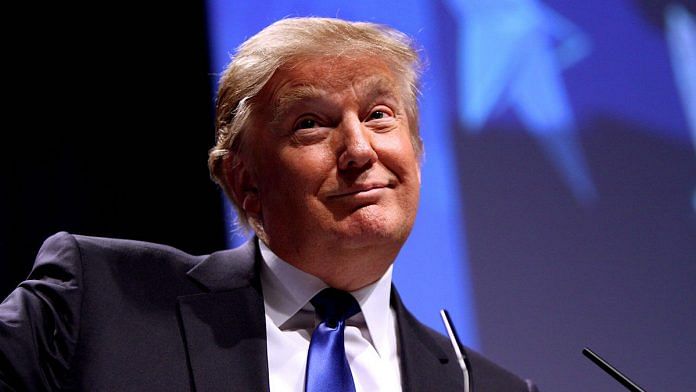America needs to stop being obsessed with Trump
What does a narcissist – as Donald Trump is often described – need to get their narcissism going? Attention, perhaps? That’s precisely what the Americans have given their president in abundance over the last one year.
A year into Trumpland makes the focus on his character somewhat necessary, but “as a record of his presidency so far, it is also incomplete and a dangerous distraction”, argues The Economist.
“The danger of the Trump character obsession is that it distracts from deeper changes in America’s system of government. The bureaucracy is so understaffed that it is relying on industry hacks to draft policy. They have shaped deregulation and written clauses into the tax bill that pass costs from shareholders to society. Because Senate Republicans confirmed so few judges in Mr Obama’s last two years, Mr Trump is moving the judiciary dramatically to the right (see article). And non-stop outrage also drowns out Washington’s problem: the power of the swamp and its disconnection from ordinary voters.”
“As we have written repeatedly over the past year, Mr Trump is a deeply flawed man without the judgment or temperament to lead a great country. America is being damaged by his presidency. But, after a certain point, raking over his unfitness becomes an exercise in wish-fulfilment, because the subtext is so often the desire for his early removal from office.”
It’s New Year and Germany needs a new president
After 12 years of uninterrupted rule and the mammoth refugee crisis which remains unsolved, Merkel fatigue may be setting in in Germany, writes Alexander Gorlach in The New York Times.
“Ms. Merkel may be one of the world’s most admired leaders and an inspiration for a new generation of women politicians, but at home her appeal has been more pragmatic: Her political capital derives from her ability to react to crises rather than on her conceptualizing and shaping of the country’s political agenda. To be blunt, she’s not much of a vision person.
For a time, that worked. But over Ms. Merkel’s three terms as chancellor, she led so-called grand coalitions with the center-left Social Democrats twice. Such a coalition should be able to use its supermajority to enact major reforms, to get big projects done. And yet very little has come of it. To the contrary: After 12 years and the unsolved refugee crisis that made the German public crazy, Merkel fatigue is setting in.”
Her party’s 37-year-old Jens Spahn could be her floundering presidency’s best bet. “Mr. Spahn in particular might be ready for the top spot, given his ability to tack between cosmopolitanism — he’s openly gay, and recently married his longtime partner — and public angst over the dissolution of German identity: He recently complained that he couldn’t order a coffee in Berlin without speaking English. With Ms. Merkel still floundering in the mess she created over immigration, it may be that Mr. Spahn — or someone like him — needs to take the reins,” she writes.
Would 2018 bring the end of 1979 in the Muslim world?
If there one common thread that binds the churn in Saudi Arabia and the uprising in Iran, it is to bury 1979, writes Thomas Friedman in The New York Times.
“The biggest question about the recent protests in Iran — combined with the recent lifting of religious restrictions in Saudi Arabia — is whether together they mark the beginning of the end of the hard-right puritanical turn that the Muslim world took in 1979, when, as Middle East expert Mamoun Fandy once observed, ‘Islam lost its brakes’ and the whole world felt it.
The events of 1979 diminished the status of women, pluralism and modern education across the Arab-Muslim region, and they fueled religious extremist groups like Al Qaeda, Hezbollah and ISIS, whose activities have brought ruin to so many innocent Muslims and non-Muslims alike — and so many metal detectors to airports across the globe.”
“But today Iran and Saudi Arabia have something new in common: A majority of their populations are under age 30, young people connected through social networks and smartphones. And a growing number of them are fed up with being told how to live their lives by old, corrupt or suffocating clerics — and they want to bury 1979 and everything it brought.”
“In Saudi Arabia there’s a move, from the bottom up and from the top down, to get past 1979 and birth a different social future. In Iran, there’s a move from bottom up by many youth to get past 1979, but regime hard-liners want to crush them from the top down.
We should root for both the Iranian and Saudi youth movements to bury 1979. It would be a gift for Muslims the world over — and for the world at large, which has spent trillions of dollars countering the furies fueled by that pivotal year.”
Xi’s unspoken agenda: getting men hitched
For the Chinese, unmarried people are not just a nuisance requiring to be tamed into abiding to convention by worried parents, they’re in fact a problem for the state.
“Thanks to the one-child policy and a preference for sons, China has a surplus of men. The number of unmarried men between ages 35 and 59 will reach 15 million in 2020, according to one Chinese estimate,” writes Emile Rauhala in The Washington Post.
“Concerned that the gender imbalance could create instability, the ruling party first tried to shame single women into marriage, calling them “leftover” and comparing them to yellowed pearls.
Now it has settled on a more robust market intervention: mass matchmaking.
In Zhejiang, a prosperous province in southern China, an estimated 100,000 young people attended Communist Youth League dating events last year, the group says.”



